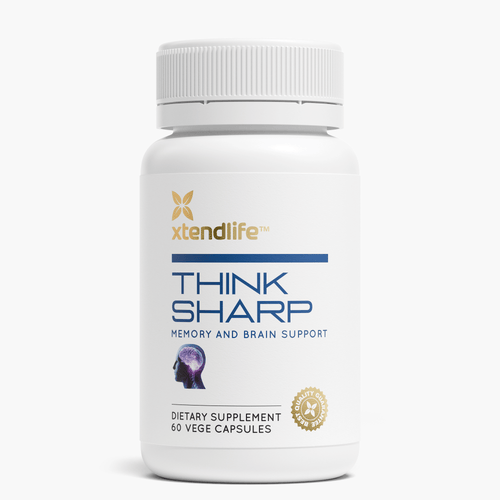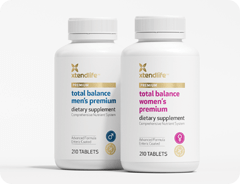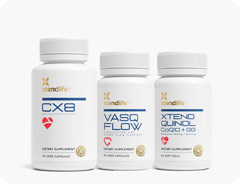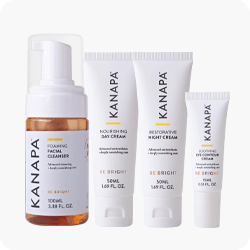Think of your brain as a finely tuned engine. With time, it may lose a little of its efficiency. This is totally natural, and it’s part of the aging process. But here's the catch: just as regular maintenance keeps your car running, the right choices can help your brain stay in peak condition.
While brain aging can result in slower recall or occasional forgetfulness (like misplacing your keys), it doesn’t have to mean cognitive decline. Genetics play a role, yes—but so do the decisions you make every day. By focusing on smart nutrition, you can keep your brain sharp and reduce the risk of serious conditions like Alzheimer's or Parkinson’s.
This blog dives into the science of brain health, giving you evidence-based tips to fuel your brain and thrive.
Ready to give your brain a boost? Here’s what the science says works wonders.
The MIND Diet: A Proven Blueprint
Imagine a diet so powerful that it can make your brain up to 7.5 years younger—sounds incredible, right? That’s what scientists called the MIND Diet, which stands for Mediterranean-DASH Diet Intervention for Neurodegenerative Delay. It combines the best of the Mediterranean and DASH diets, with a twist, focusing on foods proven to protect your brain and slash the risk of Alzheimer’s.
Highlights of the MIND Diet:
- Leafy greens: Packed with vitamin K and antioxidants, leafy greens like kale and spinach help slow cognitive decline and support overall brain health. Aim for at least six servings per week and include another non-starchy vegetable daily.
- Berries:Rich in flavonoids, these vibrant fruits enhance memory and protect brain cells from oxidative stress. Enjoy at least two servings per week, including blueberries, strawberries, and blackberries.
- Nuts and olive oil: These healthy fats provide essential nutrients that shield neurons from damage and reduce inflammation. Incorporate a handful of nuts or use olive oil as your primary cooking fat daily.
- Whole grains: High in fiber and essential nutrients, whole grains promote steady energy levels and support brain function. Consume at least three servings per day, choosing options like quinoa, brown rice, oats, and whole-wheat products.
- Beans:A great source of plant-based protein and fiber, beans help regulate blood sugar levels and provide sustained energy for the brain. Include them in at least four meals per week, incorporating lentils, chickpeas, and black beans.
- Fish: Fatty fish is rich in omega-3 fatty acids, which are essential for neuron communication and cognitive health. Eat at least one serving per week, focusing on salmon, sardines, or mackerel.
- Poultry:Lean protein sources like chicken and turkey provide B vitamins, which are crucial for brain function. Include them at least twice a week, but avoid deep-fried options.
- Wine:Some research suggests that resveratrol, a compound found in red wine, may help protect against Alzheimer's. If you drink alcohol, limit it to no more than one glass per day to maintain balance and avoid negative effects.
The Research Says...
Proof of the benefits of the MIND diet comes from data from 960 people from 40 retirement communities. During the nine-year study, participants had an annual clinical evaluation to determine their cognitive state and completed a dietary questionnaire to determine their consumption of different foods.
Those who scored highest in terms of eating according to the MIND diet had brains that were 7.5 years younger.
The study found that those who adhered most closely to the MIND diet experienced a 53% lower risk of Alzheimer’s. Even moderate adherence brought a 35% reduction.
Recently, in February 2025, a comprehensive review of 13 studies published in Nutrition Reviews also highlighted that the Mediterranean diet might reduce the risks of depression, anxiety, and ADHD in children and teenagers. It’s proof that what you eat directly impacts your brain health!
Mental Clarity Begins From Within
Formulated with Sibelius Sage®, Huperzine A, and Bacopa Extract for a fast brain boost, and targeted nutrition in the form of B-vitamins + folate for long-term support of brain health.
Shop now
Omega-3 Fatty Acids: Nourishing Your Brain's Foundation
Omega-3 fatty acids, particularly DHA (docosahexaenoic acid), are indispensable for maintaining brain structure and function. DHA is the most abundant long-chain polyunsaturated fatty acid in the brain and plays a critical role in neuron communication and protection. It forms the backbone of your brain’s cellular structure.
Where Can You Find It?
- Fatty fish like salmon, mackerel, and sardines are the best sources.
- Prefer a plant-based option? Algae oil is your DHA-rich alternative.
The Science Backs It Up
Here’s a fun fact: DHA is the most abundant omega-3 in the brain, but levels are significantly reduced in patients with Alzheimer’s. In a meta-analysis of 21 clinical studies with over 180,000 participants, consuming just 100mg of DHA daily reduced the risk of dementia by 14% and Alzheimer’s by a whopping 37%.
To give your brain the fuel it needs, aim for at least one serving of oily fish weekly, or consider a high-quality DHA supplement.
B Vitamins: The Brain’s Hidden Shield
When we talk about brain nutrition, B vitamins often fly under the radar—but they shouldn’t! These little powerhouses, especially B6, B12, and folic acid, are critical for reducing brain shrinkage, which is a hallmark of cognitive decline.
B vitamins help lower homocysteine levels, an amino acid associated with brain atrophy. Essentially, they act as a shield, protecting your brain from damage.
Foods rich in vitamin B include:
- Animal sources: eggs, salmon, beef, milk, chicken, liver, yogurt, clams, tuna.
-
Plant sources:fortified cereals, avocados, leafy greens, sunflower seeds, legumes, and whole grains.
The Evidence:
The VITACOG Study took a group of seniors with mild cognitive impairment and split them into two groups. One group received a supplement containing B6, B12, and folic acid; the other got a placebo. After two years, brain scans revealed that those in the B-vitamin group experienced 30% less brain atrophy. That’s a massive reduction and a strong case for getting enough B vitamins, either through diet or supplementation.
Additionally, reducing your intake of sugar also makes sense; it's a factor that is proven by research to contribute to healthy brain aging.
We hope this blog has shown that with the right nutrition, it is possible to protect your brain and slow the process of brain aging. There is a lot of research about the importance of physical and mental activity for brain health too (although not enough space to cover that here).
It's never too late to make radical lifestyle changes. Start by asking yourself whether you want to be the person who is "sharp as a tack" at 90. I'm sure for most of us, the answer is "yes!"
References
Zhang Y, Chen J, Qiu J, Li Y, Wang J, Jiao J. Intakes of fish and polyunsaturated fatty acids and mild-to-severe cognitive impairment risks: a dose-response meta-analysis of 21 cohort studies. Am J Clin Nutr 2016;103:330-40.
Morris, C.M., Tangney, C.C., Wang, T., Sacks, F.M., Bennett, D.A., and Aggarwal, N.T. MIND Diet Associated with Reduced Incidence of Alzheimer’s Disease. Alzheimers Dement. 2015 September ; 11(9): 1007–1014.
Morris, C.M., Tangney, C.C., Wang, T, Sacks, F.M., Barnes, L.L, Bennett, D.A., and Aggarwal, N.T. MIND diet slows cognitive decline with aging. Alzheimers Dement. 2015 September ; 11(9): 1015–1022.
Smith, D.A, Smith, S.M., de Jager, C.A, Whitbread, P., Johnston, C., Agacinski, G., Oulhaj, A., Bradley, K.M., Jacoby, R., Refsum, H., Homocysteine-Lowering by B Vitamins Slows the Rate of Accelerated Brain Atrophy in Mild Cognitive Impairment: A Randomized Controlled Trial. PLoS ONE 1 September 2010, Volume 5, Issue 9, e12244.
Selhub, J., Troen, A., and Rosenberg, R.I. B vitamins and the aging brain. Nutrition Reviews Vol. 68(Suppl. 2):S112–S118, 2010.
Mattson, M.P., and Arumugam, T.V. Hallmarks of Brain Aging: Adaptive and Pathological Modification by Metabolic States. Cell Metab. 2018 June 05; 27(6): 1176–1199.


 Supplements
Supplements Superfoods
Superfoods Bundles
Bundles









